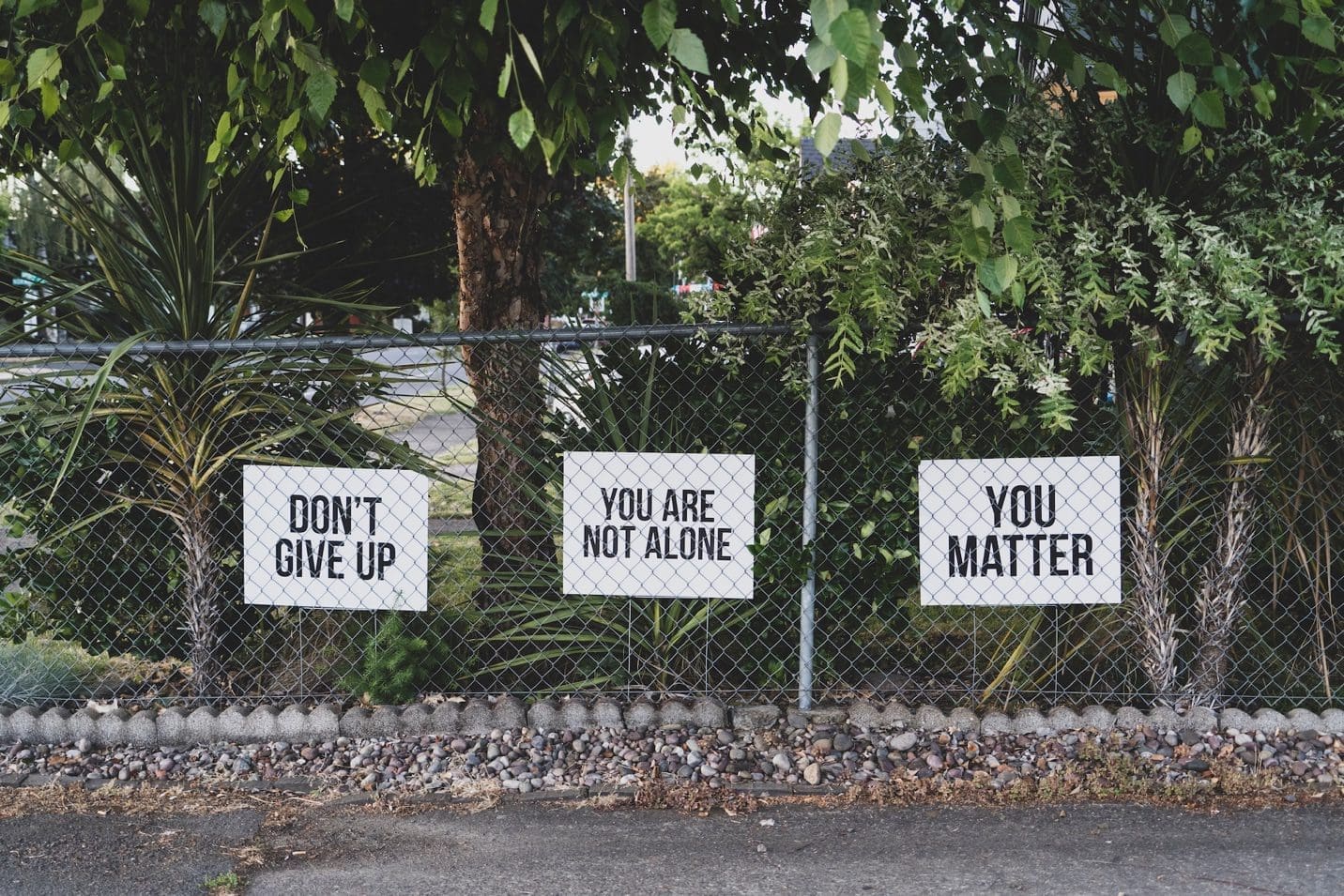When there are lonely days…
“Tell me one last thing,” said Harry. “Is this real? Or is this happening in my head?”
Dumbledore beamed at him. “Of course, it is happening in your head, Harry, but why on earth should that mean it is not real?”
Taking the first step to helping someone you think may be struggling with a mental health problem is equivalent to focusing on your compassion on them. The term “compassion” comes from a Latin word meaning “to suffer with.” Helping someone who is struggling with their mental health requires entry-level compassion – to be moved by their struggle and choosing to be there for them. When trying to be compassionate, which involves empathy, so many thoughts will go through your mind that you may never say aloud, and so many things you may say aloud never goes through your mind. Being compassionate requires the ability to relate to the feelings of another before anything slips out of your mouth.
Through my professional life as a nurse, a divorce lawyer, and my personal involvement as caretaker for my husband, I’ve learned that there’s a reason in a person’s life experiences to account for their psychological anguish without labeling them with a mental “disease” and calling it a day. It always seemed to me that the psychological struggles one has is the result of complex processes closely bound to their life experiences and emotional development.
In the United States, to get someone who is struggling with their mental health the care they need, it’s necessary to first identify the type of psychological strains they’re experiencing. The most common mental health disorders in the United States are:
Anxiety Disorders
People who tend to have frequent distress involving fear and apprehension may have an anxiety disorder. While most of us normally experience these feelings during stressful situations, such as a job interview or public speaking, those with anxiety disorders feel extreme anxiety symptoms in situations most of us would find to not be stressful. Anxiety is a blanket term that includes generalized anxiety disorder (GAD), obsessive-compulsive disorder (OCD), panic disorder, post-traumatic disorder (PTSD), and social anxiety.
Mood Disorders
People who are subject to mood swings that can disrupt their daily life may have a mood disorder. They may experience feelings of profound sadness, anxiety, feelings of hopelessness, low self-esteem, and decreased energy. The most common mood disorders are major depression, dysthymia, bipolar disorder, and substance – induced mood disorder.
Eating Disorders
Not about a person’s relationship to food, an eating disorder is complex combination of low self-esteem, perfectionism, behavioral inflexibility, impulsive behavior and troubled relationships. Many researchers believe it’s a person’s attempt to control themselves in an environment where they feel they have no control. The most common types are, anorexia, bulimia, binge eating disorder, pica eating disorder (eating and craving things that are not food), and rumination disorder (repetitive, habitual regurgitating of food that may be only partly digested).
Dementia
Often thought of as a single disorder, dementia is a term that covers a wide range of specific mental conditions, including: Parkinson’s disease, frontotemporal dementia, Huntington’s disease and Wernicke-Korsakoff syndrome.
Psychotic Disorders
Those suffering from a psychotic disorder may be unable to perceive what is real and what is not and it may change a person’s sense of reality.
Recent scientific research reports that some viruses may affect how the brain’s circuits work. Extreme stress may trigger an event; as well as some forms of drug abuse. The most common psychotic disorders are schizophrenia, a brief psychotic disorder, delusional disorder, and substance-induced psychotic disorder.
Unlike cancer or autoimmune diseases, such as rheumatoid arthritis, there are severe limitations to identifying the exact type of mental stress somone may be suffering from. There are no measurable physical markers for mental illness such as blood tests, biopsies, radiographs or scans that can either support or rule out a psychiatric diagnosis.
A well documented example of how profoundly damaging a medical misdiagnosis can be is seen in Cracked Up, a film about Darrell Hammond’s life experiences and frequent mental health misdiagnoses. In the documentary, at the age of 19, Hammond was a freshman journalism student at the University of Florida when he had his first searing experience of mental distress. He was treated for depression and paranoia, and prescribed an antidepressant and an antipsychotic drug. Over the next decade he estimated that he saw at least forty psychiatrists and was labeled with a multitude of mental disorders. He was sometimes told that his illness was caused by a biological disease of his brain.
Despite his “mental disease”, he had an unprecedented fourteen years of success on Saturday Night Live, where he was a master impressionist of, among others, Bill Clinton and Sean Connery.
Thirty-five years into his psychiatric “treatment”, he was seen by Dr. Nabil Kotbi a Psychiatrist at Weill Cornell Medicine, who Hammond says changed his life with two short sentences:
“I don’t want you to call what you have a mental illness. You have been injured.”
Hammond explains that “What I heard the doctor say that day was that mental illness comes from somewhere very specific. It has a story, and in that story, you’re the only one who has no power.” He went on to explain that in the decades he’d been treated for mental illness no one asked him about his traumatic childhood and the impact it was having on his present condition.
Although currently, psychiatry clings to a specifically genetic narrative for mental illness, Hammond’s experience informs us that a person’s experience in terms of how they were parented has a deeper impact on them than their parent’s DNA.
According to Dr. Gabor Mate, whose books, In the Realm of Hungry Ghosts: Close Encounters with Addiction, and The Myth of Normal Trauma, Illness, & Healing in A Toxic Culture, doctors receive little training on how to be curious about or explore the life story of someone experiencing a mental struggle. Gabor writes:
“Many doctors are intensely uncomfortable facing their own hidden sorrows and wounds.”
And he cites:
“A well known colleague told me that patients play into this as well. They don’t want to look at their lives, either. It would involve getting into recovery, changing something. It’s enormous work to recover from our childhoods. It’s incredibly worthwhile but it’s a lot of work.”
So, at this point, you may be asking yourself, “if a doctor, after all that training doesn’t inquire about the life experience of a person struggling mentally what am I supposed to do?” The answer is, these three things:
- Learn what the the signs are and how to identify someone who is struggling mentally. Often, you’ll notice there are changes in their behavior, such as mood swings, angry outbursts, loss of interest in activities they’ve previously enjoyed and/or self-medicating with drugs or alcohol.
- Reach out to them. Most of us don’t need a psychiatric therapist as much as a friend to listen who will listen. Listening with genuine intent for the sole purpose of understanding what the other person is trying to convey without commenting or reacting in any way if very effective. The English clergyman and philosopher Robert Crowell said, “The light of friendship is like the light of phosphorous, seen plainest when all around is dark.”
- Connect them with help. Paraphrase those simple sentences that Dr. Kotbi said to Hammond. “I’m not going to label you as mentally ill. You have a story about how you’ve been injured by life and only you have the power to tell it. I’m here to listen. And if you want to help, I’ll help you find what you need.”
What do you do if someone doesn’t want your help?
Be patient!
You won’t know the real reason why they say they don’t want help.
Offer emotional support and reassurance.
Let them know you care about them and you’ll be there if they change their mind.
Inform them how to seek help when they’re ready.
You can Google resources and suggest that they talk to their general practioner when ready.
Supporting someone with mental challenges can be daunting. Make sure you take care of yourself and look after your own well-being too. Take a break when you need, talk to someone you trust about how you are feeling, set boundaries and be realistic about what you can do.
Remember, you too, have your own core childhood wounds. As Rose Kennedy said:
“It has been said that time heals all wounds. I don’t agree. The wounds remain. Time – the mind, protecting its sanity– covers them with some scar tissue and the pain lessens, but it is never gone.”





Love this post! I think it is so important for clinicians and friends/family to see mental health through the lens of trauma.
Once again Nancy takes a very complex subject and organizes it so it’s a bit easier to understand. She also offers some simple quidelines to follow if you are the person trying to help someone else in case they are not ready or willing to have professional help yet.
Written with clarity, highlighting the importance of social support in a compassionate and empathic way, helping someone who may be suffering from the wounds of trauma. I don’t think anyone truly escapes some sort of trauma in their life history. I mean, is it possible that anyone can be raised in a perfect environment, have perfect life experiences? I think not. What Nancy has outlined, another way to look at struggles, no matter within ourselves or a person we may know. Post Covid and this political divide and unrest in our country, it’s no wonder the mental health of many have escalated. As community members, friend, families, co-workers, neighbors, it is important to reach out with compassion and empathy to be as supportive as we can. And for ourselves, reach for help before conditions escalate. Stigmas are surrounding mental health are being removed, slowly, though. Thank you Nancy for sharing your vast knowledge and insights.
I love Rose Kennedy’s quote. So many people say that time heals all wounds. I’d never heard anyone disagree with that, until Rose Kennedy. After I thought about it, I totally agree with her! A very helpful insight!